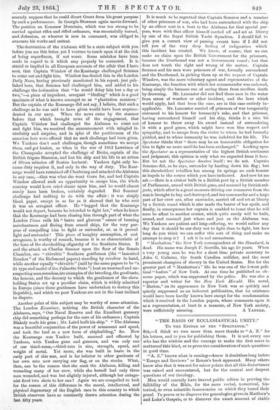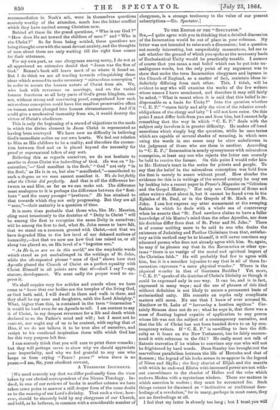"THE BASIS OF ECCLESIASTICAL UNITY."
To THE EDITOR OF THE " SPECTATOR."
Sin,—I think we owe more than mere thanks to "A. Z." for his letters, and to you for publishing them. It is not every one who has the wisdom and the courage to make the first move in mattersof this kind, or to press the consideration of such questions in good time.
"A. Z." knows what is coming—knew it doubtless long beforo "Essays and Reviews" or Renan's book appeared. Many others know also that it was not for minor points that all this disturbance was raised and encountered, but for the central and deepest questions of our theology. Men would scarcely have braved public odium in proving the fallibility of the Bible, for the mere verbal, numerical, his- torical, or even scientific inaccuracies on which they based their proof. To prove or to disprove the genealogies given in Matthew's and Luke's Gospels, or to discover the exact amount of stable accommodation in Noah's ark, were in themselves questions scarcely worthy of the attention, much less the bitter conflict which they have excited among Christian men. Behind all these lie the grand questions, " Who is our God ?" "How does He act toward the children of men ?" and " Who is the Christ ?" So far from being settled, these questions are being thought overwith the most devout anxiety, and the thoughts of men about them are only waiting till the right time comes for their utterance.
For my own part, as one clergyman among many, I do not at all apprehend an extensive denial that "Jesus was the Son of God." Renan's book will leave most of us where it found us. But I do think we are all tending towards relinquishing those ideas which seemed to make necessary " miraculous conception " in order to secure the human nature of Christ from sin. We, who look with reverence on marriage, and on the varied human functions as all holy parts of God's great kingdom, can- not, without strong and convincing proof, comprehend how such miraculous conception could have the smallest preservative effect on human nature plunged into human circumstances. And if it could give a mechanical immunity from sin, it would destroy the virtue of Christ's obedience.
This is only the beginning of a crowd of objections to the mode in which the divine element in Jesus Christ is represented as having been conveyed. We have now no difficulty in believing God's immediate action on our own hearts. We feel our relation to Him as His children to be a reality, and therefore the connec- tion between God and us is placed beyond the necessity for proof or supernatural token of any sort.
Believing this as regards ourselves, we do not hesitate to ascribe to Jesus Christ the indwelling of God. He was an " In- carnation,"—‘. God manifest in the flesh," " God " not only " in the flesh," as He is in us, but also " utanifested,"—manifested to such a degree as we men cannot manifest it. We do but feebly what the Christ did perfectly. And that is all the difference be- tween us and Him, as far as we can make out. The difference most analogous to it is perhaps the difference between the " first- born " and the many younger " brethren." He has attained to that towards which they are only progressing. But they are all "sons,"—their maturity is a question of time.
It is more than probable that those who, like Mr. Maurice, cling most tenaciously to the doctrine of " Deity in Christ " will be among the first to recognize the same Deity in ourselves ; will be among the first to feel, what St. John seems to have felt, that we stand on a common ground with Christ,—not that we have degraded Him to the low level of our debased notions of humauity,—but that we now see how God has raised us, or all along has placed us, on His level of a " begotten son."
" As Ile is, so are we in this world," are the emphatic words which stand as yet unchallenged in the writings of St. John, while the oft-repeated phrase " sons of God" shows how that Apostle placed the Church of Christ on a perfect equality with Christ Himself in all points save that of—shall I say ?—age, stature, development. We want sadly the proper word to ex- press it.
We shall require very few articles and creeds when we have come to "know that our bodies are the temples of the living God, as God hath said, I will dwell in them and walk in them, and they shall be my sons and daughters, saith the Lord Almighty." What, higher than this, is contained in the term " incarnation " it would be hard even for an Apostle to tell. I am content to say it of Christ, in my deepest reverence for a life and death which declared to us the Father's mind and will ; but I must not be contunt, nor ought any of us to be content, with saying that of Him, if we do not believe it to be true also of ourselves, and resign to his continual inspiration those wills which God has for this very purpose left free.
I can scarcely think that you will care to print these remarks ;
but they will perhaps serve to show why we should appreciate your impartiality, and why wo feel grateful to any one who keeps us . from crying " Peace ! peace !" when there is no peace.—I am, Sir, your obedient servant, A YORKSHIRE INCUMBENT.
.Wd need scarcely say that wo differ profoundly from the view taken by our clerical correspondent of the Nicene Theology. In- ' deed, in one of our reviews of books in another column we have taken some pains to answer a still deeper form of the same doubt as to the meaning of our Lord's divinity. That such a view, how- ever, should be sincerely held by any clergyman of our Church, and held, as he believes, in common with a considerable number of
clergymen, is a strange testimony to the value of our present subscriptions.—En. Spectator.]































 Previous page
Previous page